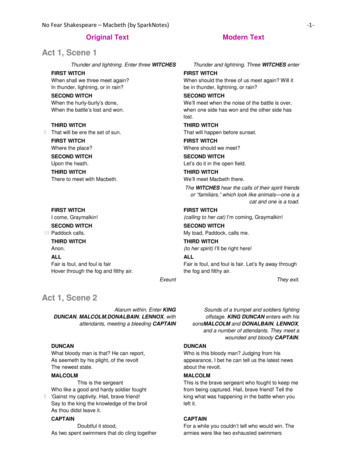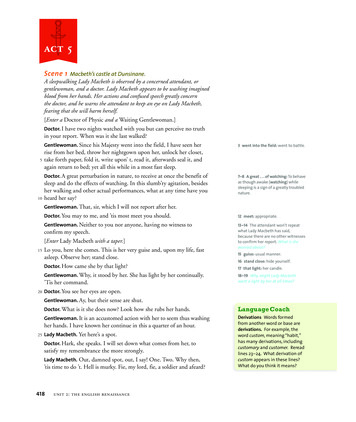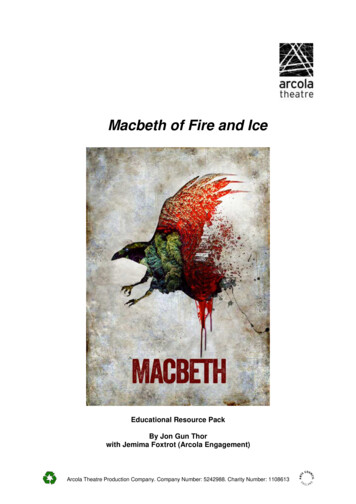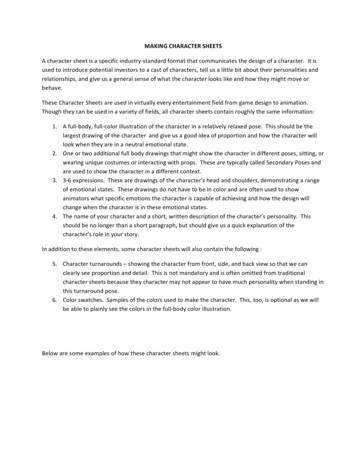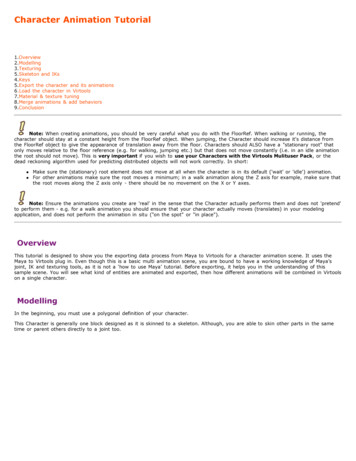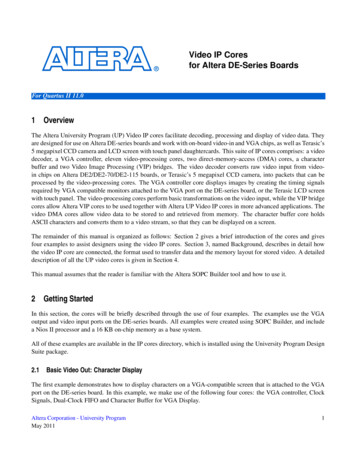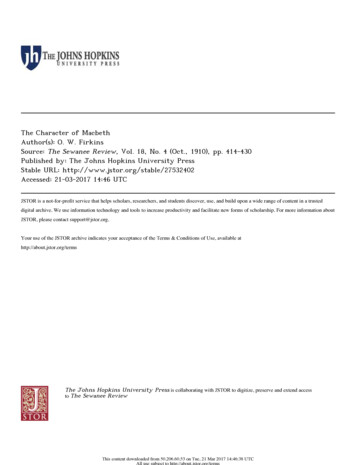
Transcription
The Character of MacbethAuthor(s): O. W. FirkinsSource: The Sewanee Review, Vol. 18, No. 4 (Oct., 1910), pp. 414-430Published by: The Johns Hopkins University PressStable URL: http://www.jstor.org/stable/27532402Accessed: 21-03-2017 14:46 UTCJSTOR is a not-for-profit service that helps scholars, researchers, and students discover, use, and build upon a wide range of content in a trusteddigital archive. We use information technology and tools to increase productivity and facilitate new forms of scholarship. For more information aboutJSTOR, please contact support@jstor.org.Your use of the JSTOR archive indicates your acceptance of the Terms & Conditions of Use, available athttp://about.jstor.org/termsThe Johns Hopkins University Press is collaborating with JSTOR to digitize, preserve and extend accessto The Sewanee ReviewThis content downloaded from 50.206.60.53 on Tue, 21 Mar 2017 14:46:38 UTCAll use subject to http://about.jstor.org/terms
THE CHARACTER OF MACBETHMr. Barrett Wendell in his book on Shakespeare emphasizes the interesting suggestion that there are gaps or omissionsin our present version of Macbeth corresponding to the lost orunwritten parts of a larger and more varied play than that embodied in the current text. There may or may not be lacunaein the play: what is more certain and not less interesting isthe presence of lacunae in the delineation of Macbeth. Wefeel that that delineation, vivid as it is, leaves many questionsunanswered; whole tracts, great provinces, of his life andactivity remain untouched in the representation. He is shownto us in a series of situations that are at once very extraordinaryand somewhat monotonous. Action in the form of crime andretribution in the form of self-torture make up the bulk, almostthe total, of his recorded experience. To see Kean was to readShakespeare by flashes of lightning; it might be said that toread Macbeth is to observe the hero by lightning-flashes.Kean's auditors may sometimes have wished for a ray or two ofcommonplace daylight; and the students of Macbeth's characterwould have liked to see him from time to time as he ate anddrank, talked and trafficked, counseled and wrought, in the dailyround of life.I am far from asserting that the character is incoherent or incongruous; nothing more can be said than that Shakespeare isuncommunicative with respect to sundry parts of Macbeth'snature; a point is reached in the delineation where "the restis silence." This no more implies a rupture or disjunction inthe fabric of the man himself than the obscuration by fog ofcertain sections of a mountain-slope implies a break in the cohesion of the ridge. Whether the hiatus in our conceptionrepresents a hiatus in Shakespeare's is a point not easy to determine. With us, as with Macbeth in the first encounter withthe witches, revelation ends before curiosity is satisfied; thesame cry which Macbeth utters to the Weird Women,?Stay, you imperfect speakers, tell me more?This content downloaded from 50.206.60.53 on Tue, 21 Mar 2017 14:46:38 UTCAll use subject to http://about.jstor.org/terms
The Character of Macbethwe could almost repeat to Shakespeare. But are we sure thatthe witches knew more than they disclosed? And we are quitecertain that Shakespeare knew much more of Macbeth than hehas chosen to reveal to us. Would it not have been highlycharacteristic, highly Shakespearean, for the great dramatist,after choosing the events and situations to be portrayed, tovivify or vitalize in his inner vision the moral traits bearing onthose events and situations, and to leave the rest in totalobscurity or doubtful twilight? Was he not just the type ofman to use the torch he carried no further than it threw lightupon its path ?The study of Macbeth's character is hampered in another wayby the comparative meagreness of his self-expression. Manyreaders would doubtless be surprised to learn how little Macbethactually says. In the long and important third scene of the firstact he speaks only thirteen times; in his first talk with his wifehe speaks three times and utters fifteen words ; in the hesitationscene that closes the first act, he speaks seven times, once atgreat length ; in the dagger scene he speaks six times ; in thecourtyard after the murder, a scene which expands in our excited minds to epical or c?smica! dimensions, he speaks thirteentimes; in the entire fifth act there are only twenty-six speeches.It is obvious that a delineation on this scale, however amplefor the imagination, is inadequate for purposes of analysis. Itfollows that the analytic faculty is obliged to husband its resources, to search out and utilize every shred and scrap of available material. Shakespearean scholarship, to make any progressat all with these meagre materials, must proceed on the hypothesis that everything is a datum, that every word or movement,however minute, is a part of the testimony. In physical sciencesuch an hypothesis would be perfectly sound ; there is no ascertainable fact about a stone or animal which may not, and shouldnot, form a part of a perfect conception of that stone or animal.But in the study of Shakespeare a liberal mind becomes moreand more convinced of the unsoundness of the presumptionwhich attributes to every utterance of every character the- maximum of intention and significance, while at the same time it perceives that under any other supposition progres3 in the unThis content downloaded from 50.206.60.53 on Tue, 21 Mar 2017 14:46:38 UTCAll use subject to http://about.jstor.org/terms415
4i6The Sewanee Reviewraveling of the more difficult characters is impossible InShakespeare men speak for many other ends than that ofself-revelation; there are plots to carry forward, poetry to declaim, aphorisms to enunciate; they must enlighten audiences,amuse groundlings, and compliment kings. Even this leavesout of account the wide scope for accident and negligence in amind prone, as we can hardly doubt, to take a liberal and lenientview of its own obligations and shortcomings.- One can readilyfancy Shakespeare as acting on the principle, which is in manyways a sound and sagacious principle, that all kinds of men do allsorts of things, and, where a given thing was to be done or said,assigning it without too much scruple to the actor occupying forthe moment the centre of the stage.The character of Macbeth furnishes a good illustration of thedifficulty in question. The evidence for many traits in thenature of Macbeth is confined to single passages, occasionally tobrief suggestions. The imputation of avarice to the usurper inhis decadence rests upon one word in one speech in the mouthof an enemy (Malcolm, in the third scene of the fourth act).The imputation of profligacy rests upon exactly the same basis.A single inconclusive speech in the fifth act is our warrant forconcluding that his affection for his wife has materially declined.A single exclamation of four words "I would thou couldst!" isthe sum of the evidence we possess that he repented evenmomentarily of any one of his murders. One speech and oneonly, "I dare do all that may become a man," breathes a clearnote of manly rectitude. A sympathetic and reverential attitude toward virtue is displayed just once in the reference to themeek and angel-like virtues of the unhappy Duncan. In asingle scene, the third of the fifth act, he rails and curses in afashion to which there is no parallel and no near approach in theremainder of the play. The evidence of concern for his ownsoul is clear-cut, but very meagre. The evidence of tact andefficiency in the conduct of affairs which may be cited from thefirst part of the third act is small in amount and dubious incharacter. How much weight should be given to such meagreand casual indications? It is hard to say. It seems unlikelythat Shakespeare could mean that any trait should stand outThis content downloaded from 50.206.60.53 on Tue, 21 Mar 2017 14:46:38 UTCAll use subject to http://about.jstor.org/terms
The Character of Macbeth417strongly in our conceptions, or rather in the conceptions of hisaudience, unless it figured largely in the delineation. He-didnot draw men in cipher or cryptogram; he drew them largely,plainly, boldly, for the common untrained eye. On the otherhand, if we assume that nothing is authentic which is notprominent, that nothing is discoverable which is not obvious,advance is barred and scholarship in this field becomes abortive.My own view of the character of Macbeth is not revolutionary.I subscribe to most of the current opinions, and shall ratheraim to insert my judgments in the clefts or interstices of theaccepted notions than to overturn or displace them. I am prepared to admit that Macbeth's physical courage was unquestionable, that he was ambitious and unprincipled, that he probablyentertained the thought of murder before the meeting with thewitches, that his character rapidly degenerates in the last acts,that his love for his wife, at first of singular tenderness and intensity, is latterly somewhat impaired, that his chief point ofdistinction from the vulgar usurper and assassin is a vivid,poetical, masterful imagination.The last point, however, deserves a somewhat fuller investigation. In respect to the gloomy and restricted nature of theimagination of Macbeth I should say that I was in entire accordwith the ablest of recent scholars, if agreement itself were nota species of presumption in relation to a critic of the stamp ofDr. Bradley. Two points, however, have scarcely received theattention which they merit,?the cosmic or boundless quality ofthis imagination, and its unrivaled fixity and tenacity. Macbethsees things in their breadth or infinity. His thoughts are"broad and general as the casing air," and to be cribbed orconfined is the type of unbearable torture. The whole "halfworld" with its aggregated misdeeds rises before his vision ashe waits in the courtyard for the bell that summons him to themurder. The whole sea is present to his imagination when helooks despairingly at the hands that all Neptune's ocean cannotwash clean. His fancy sees the lines of Banquo's descendantsstretching out to the "crack of doom," and the succession ofblank to-morrows reaching to "the last syllable of recorded time. ' *?7This content downloaded from 50.206.60.53 on Tue, 21 Mar 2017 14:46:38 UTCAll use subject to http://about.jstor.org/terms
4i8The Sewanee ReviewHe views the commotions of the elements less from the stationof the petty mundane beholder than from the point of vantageof a superhuman observer commanding the entire breadth ofthe planet.But the concentration of this picture-making power is hardlyless remarkable than its sweep. If I had to express the truth inmetaphor, I should say that his imagination had talons. Thereis a grip, a clutch, an insistence, a tenacity, in his mental processes, which suggests the idea of possession. An imageconquers, masters, enslaves, engrosses him ; he is in its leash ;he obeys and cringes. Sight has for him the power of touch : thecrown sears his eyeballs; the bloody hands pluck out his eyes.He cannot rid himself of a visual image; the imaginary daggerside by side with the real one which he has drawn to disproveits existence retains its actuality. If the murderer had merelytold him that Banquo was dead, Macbeth would have seen noghost at the supper. It was the addition of the picturesqueadjuncts:?Safe in a ditch he bides,With twenty trenched gashes on his head ?that wrought the mischief. The murderer spoke of twentygashes: Macbeth speaks of "twenty mortal murders ontheir crown:" a clear proof that the phantom is only the materialization of the terrible image which the murderer's wordshad etched upon that receptive and tenacious brain. Theimportunity, the inveteracy, of certain sense-impressions is oneof the memorable points in his constitution. The first prophecyof the witches, the imaginary voice calling, "Sleep no more,"the thought of Birnam wood and the immunity from all bornof women, infix and imbed themselves in the tissues of hisfantasy to an extent which makes him forgetful of his surroundings and insensible to the gravest perils.His imagination is penal and retributive, as every reader atonce perceives; but it is not a source of unmixed pain. Thereis an awe not unmixed with charm in the solemn and mysteriousrelation which the crimes of Macbeth establish between his ownsoul and the great material and moral forces in the cosmos,earth, the stars, night, heaven, and hell ; and Macbeth was theThis content downloaded from 50.206.60.53 on Tue, 21 Mar 2017 14:46:38 UTCAll use subject to http://about.jstor.org/terms
The Character of Macbeth419man of all others to feel and value that awe. It is hard tobelieve that he could have pronounced the famous passagedescribing the descent of night, "ere the bat hath flown hiscloister'd flight," etc., perhaps the finest lines of their kind inliterature, without sharing in the profound and melancholy pleasure with which Shakespeare wrote, and every reader reads, theselines. There is a passage in the dagger scene which bringsout this trait with extraordinary clearness. Macbeth entreats theearth to muffle his steps. Now there is a very obvious andweighty reason wThy an assassin should value silence, and weare so much under the yoke of this idea that we can read thepassage more than once without noticing that Macbeth has givenhis own reason for his wish and that that reason is entirelydifferent from the one in our minds. Macbeth fears that thesoundswill take the present horror from the timeWhich now suits with it.In other words, he feels an artistic and dramatic propriety inthe silence, the removal of which would interfere with the aesthetic enjoyment of the situtaion. The retention of any care forpoetical and artistic fitness in that crucial and appalling momentis the mark of what we might almost call the epicure in crime.It might have furnished De Quincey with a point for his"Murder as one of the Fine Arts." That this pleasure is inany degree commensurate or even comparable with the sufferingwhich it accompanies, no man in his senses would assert; but itsmere existence is noteworthy and enlightening.Another trait which it is impossible to overlook and yet easyto undervalue is Macbeth's inclination to brooding, abstraction,profound reverie, bordering upon trance. In the first scene withthe witches, the word "rapt" is twice applied to Macbeth, thefirst occasion arising only eight lines below the point at whichthe third witch has uttered the momentous and fatal ascription.In the latter part of the scene he remains so long engrossed inthought that even his respectful companions are obliged towaive their deference far enough to remind him of the need ofexpedition. In the dagger scene he is again submerged in hisown reflections; in the courtyard scene with Lady Macbeth,This content downloaded from 50.206.60.53 on Tue, 21 Mar 2017 14:46:38 UTCAll use subject to http://about.jstor.org/terms
420The Sewanee Reviewwhere the motives to action and speed are peremptory, hiswords carry with them a sense of distance and solitude as ifthey rose from the depths of a well or the gratings of a stronghold. More remarkable still, perhaps, is the drop from the fieryvehemence of his challenge and defiance to the spirit of Banquoto the mood of tranquil and dream-like reverie suggested in thewords :?Can such things be,And overcome us like a summer's cloud,Without our special wonder ?lines almost mimetic of the "tranced summer calm" of the stillwhite cloud in the peaceful heavens. The third scene of thefifth act is highly suggestive in its picture of the suddentransition from moods of frantic violence to the calmness ofdeep and melancholy abstraction. We are somewhat blinded tothe frequency and significance of episodes like these by the factthat Macbeth is a warrior and a sovereign, and that his reveriesare interspaced by sudden, drastic, and decisive actions.We might expect that Macbeth's reflections would be confinedto the state of his own mind and fortunes. We are surprised,however, to find in this brawny Scotch thane with his soldierlyprowess and his political ambition a tendency to generalize, toreason from himself to mankind, and from his own experience tolife in the aggregate. Macbeth is fond of the impersonal'we,'the 'we' that stands for the race, or a large section of humanity. "We still have judgment here," "we but teach bloody instructions," "can such things be, and overcome us," "all ouryesterdays have lighted fools." He coins aphorisms: "presentfears are less than horrible imaginings," "the labour we delightin physics pain," "bloody instructions . . . return to plaguethe inventor," "vaulting ambition . . . o'erleaps itself," "theflighty purpose never is o'ertook unless the deed go with it,""life's but a walking shadow," "who dares do more is none."He can generalize about sleep in a moment of anguish; Banquo's ghost has been gone but half a second before he has so farmastered his frenzy as to be able to draw a distinction betweenpresent and past times in the matter of the reappearance of4ead bodies. Even in the last act when his egotism is unThis content downloaded from 50.206.60.53 on Tue, 21 Mar 2017 14:46:38 UTCAll use subject to http://about.jstor.org/terms
The Character of Macbeth421trammelled, when his self-engrossment has reached a pointwhere it begins to encroach on the one great unselfish passionof his soul, his love for his wife, he is still capable of throwinghis thoughts into form which makes their compass as wide asthe race. It is the life of all men which he likens to the poorplayer and the idiot's tale.Another feature of these reflective passages is the ingenuityand dexterity of the expression, the trimness and expertnessboth of the logical and the literary form. Macbeth's thoughtson the witches' salutation embody themselves in the followingshapely and pointed dilemma and antithesis :?This supernatural solicitingCannot be ill ; cannot be good : if ill,Why hath it given me earnest of success,Commencing in a truth ? I am thane of Cawdor :If good?[etc.].A French stylist could not have turned the phrases moredeftly. And this is done under what circumstances ? WThen,as Macbeth tells us, with a calm method in itself suggestive,his hair is standing on end and hi? seated heart is knocking athis ribs. To all of which he has equanimity enough to add theremark that these proceedings are against the uses of nature.Observe, again, the perfect order, the luminous distinctions, inthe strenuous soliloquy that opens the seventh scene of the firstact. He makes a supposition contrary to fact, that murder hasno earthly penalties, discusses and rejects it, then reverts to theopposite and authentic supposition. He goes on to state thecase against the murder with a deftness and precision worthy ofDavid Hume or Adam Smith:?He's here in double trust :First, as I am his kinsman and his subject,Strong both against the deed ; then, as his host,Who should against his murderer shut the door?[etc.].In the first scene of the third act the separation of Banquo'squalities into two groups or planes, and the superposition ofone of these groups or planes upon the other (lines 49-54) areaccomplished with equal dexterity. Another instance of thismastery of form is the unbending terseness of the famous :?This content downloaded from 50.206.60.53 on Tue, 21 Mar 2017 14:46:38 UTCAll use subject to http://about.jstor.org/terms
422The Sewanee ReviewI dare do all that may become a man ;Who dares do more is none.It is hardly safe to lay much stress on the cases of hyperboleand of aggregated and, as it were, aggravated metaphor, although their employment at a moment when Macbeth's earnestness is terrible, to wit, in the picture of the blessings of sleep,is sufficiently noteworthy. But this kind of rhetoric was sohighly prized by Shakespeare for its own sake that its appearance in the mouth of any speaker hardly establishes its claim toa place in the roll of that speaker's characteristics. If the firstspeeches of Macduff after the discovery of the murder of Duncanhad been assigned to Macbeth I should certainly have held themup as a signal and admirable example of the fustian originatingin hypocrisy, just as if Macbeth's lying speech, "the labour wedelight in physics pain," had been put into the mouth of Banquo, I should have regarded it as a clear case of the directnessand conciseness which sincerity imparts to candid utterance.Nevertheless, it is impossible to look upon the turgid rhetoricinto which Macbeth is impelled by the stringencies of deceit aswholly devoid of significance. A man to whom such rhetoricwas uncongenial would have contrived another screen: ourchoice of disguises is controlled by our real nature.An interesting question meets us at this point. The threetraits last noted, the brooding, the generalizing, the literary andlogical form, carry with them a certain presumption of want ofexecutive force, of relative inefficiency in action. On the otherhand, Macbeth's success in arms, his kingship, and his promptattainment of his leading object induce the opposite presumption. Which of these inferences is correct ? Is Macbetha real man of affairs, or is he a thinker and dreamer drifted outof his proper element?The only traces I can find of intelligent and efficient action onthe part of Macbeth occur in the first part of the third act, andare slight or equivocal. He may be dexterous, as ProfessorBradley says, in extracting from Banquo the needful informationwith respect to his ride and his company; but surely one mayoverrate the amount of tact required for asking questions on thepart of one who unites the claims of an old friend with a posiThis content downloaded from 50.206.60.53 on Tue, 21 Mar 2017 14:46:38 UTCAll use subject to http://about.jstor.org/terms
The Character of Macbeth423tion which makes every inquiry a favor. He appears also tohave carefully designed the murder of Banquo; but half hisdesign, the removal of Fleance, entirely miscarries. Everywhere else he either hesitates or blunders. He lacks the moraland facial self-control indispensable to a strategist. His wife'sceaseless vigilance is required to prevent his absence of mind orabsence of body on occasions where his presence in both modesis imperative. The company of his leading nobles at a statebanquet is no check on an outburst of frenzy.Again, Macbeth almost never shows the instincts or capacitiesof leadership. He is pushed into the murder of Duncan by acombination of fate, chance, and woman. After the discoveryof the crime, the amazement and helplessness of the spectatorsand the demand for instant action should have served as asummons to whatever powers of initiative and kingship lay dormant in his untested nature. Macbeth cannot respond to thesummons. It is true that after a time he offers the suggestionthat the lords shall arm themselves and meet in the hall ; butthis is only in reply to a suggestion of Banquo to whom he haspassively abandoned the advantage of the initial step. This canhardly be attributed to consternation; for he has just bracedhimself to the incredible hardihood of guiding Macduff to Duncan's chamber, and of waiting at the threshold, chatting withLenox about the night, until Macduff shall reappear with hisfearful tidings. His wife faints, and he leaves the care of herto Macduff and Banquo.The objects of his attack are chosen with singular ineptness.He permits the escape of Malcolm, who is a real and seriousmenace to his safety, while he marshals all his power and cunning against Banquo who is apparently tolerant of the statusquo. He allows Macduff to find an asylum in England and thenindemnifies himself by the insensate and motiveless slaughter ofhis family. In the critical juncture in the fifth act he is without policy and without resource, except that of hugging to hissoul the flattering unction of his delusive and beguilingoracles. In details he is equally impolitic. The choice of hisown castle as the place for the slaughter of one antagonist isrivaled by the choice of his own park as the spot for the assassiThis content downloaded from 50.206.60.53 on Tue, 21 Mar 2017 14:46:38 UTCAll use subject to http://about.jstor.org/terms
424The Sewanee Reviewnation of another. He appoints two men to commit a crime,and is then childish enough to add a third at the last momentwithout forewarning the original agents.I am well aware that in matters of this kind it is possible toreason too hastily from the facts to intentions., Shakespeare'splotters are among his masterly portraits, yet the plotting itselfis seldom masterly, and the acts of his villains sometimes fallfar short of the craft and address implicit in their speech andbearing. The poet's standards of strategy were not high, andacts that are clearly impolitic may sometimes be assigned to perpetrators who were meant to be sagacious. Still, after all deductions, it is hard to picture Macbeth as the typical or eventhe competent man of action. It is true that he is neither idlenor irresolute. He does much, or at all events he is very busy;and, except in the case of Duncan, he decides promptly, andadheres to his decision. But in the true tests of executive force,the wise choice of ends and means, Macbeth is altogether deficient. The choice of wise ends is so far from being numberedamong his faculties that he may scarcely be said in any propersense to choose his ends at all. He is a man who waits forguidance, one of that large class, who, in the words of anotherShakespearean conspirator and assassin, take suggestion as acat laps milk. The whole plot turns upon his wife's urgency.Throughout the first three acts he is engaged in carrying out thehints of the witches, and when by the accomplishment of thedeath of Banquo, the stock of intimations is virtually exhausted,he resorts forthwith to the Weird Women for a new installment of suggestions. Nor does his action appear to betteradvantage if tested by the choice of means. His efforts arewanting in that adjustment of deeds to perceptions which discriminates conduct from mere action. His deeds are the lurchesand plunges of the distempered spirit, not the gallop but therearing of the horse, under the spur; they "are reliefs and distractions, anaesthetics if you please, the endeavor of the rackednerves to find in action a sedative for thought. He resorts tomurder as other men to opium ; remorse or fear is slaked for thetime being by the very drug which eventually renews it; andthe second debauch is sought as an escape from the penaltiesThis content downloaded from 50.206.60.53 on Tue, 21 Mar 2017 14:46:38 UTCAll use subject to http://about.jstor.org/terms
The Character of Macbeth425of the first. These are truths old enough and clear enough toform part, as it were, of the patrimony of criticism.What, then, was the nature of Macbeth's aspiration towardkingship? Was it a form of that powerful and often beneficialinstinct which urges the man who can handle an oar or a rifleor a chisel to seek out a positon that affords him the commandof these implements ? Richard III and Edmund are sovereignsby nature, and their conduct, diabolical as it is, may be viewedin one way as nature's effort to adjust situation to character.But it is the ownership rather than the exercise of power thatcaptivates the fancy of Macbeth ; if indeed we ought not to gostill farther and affirm that for him the regalia are the kingship.His ambition is not the strong man's craving for more scopeand better tools, but the child's wish for the moon, the vaguelonging for the remote splendor. The very small extent towhich this ambition is really pictured in the play is a remarkable rather than a significant circumstance. The dramacannot be called a portrayal of the struggle between ambitionand conscience or ambition and fear, for the simple reason thatthe ambition, though present and operative, is not portrayed. It is assumed, pre-supposed, if you will ; but depictedit is not. The representation of Macbeth's desire for kingship in his own words is confined to three sentences, all inthe first act: the "happy prologue to the swelling act of theimperial theme," the brief but mighty phrase, "the greatest isbehind," and one sentence in the letter to Lady Macbeth on the"dues of rejoicing" and the promised greatness. That is thecompass of Macbeth's own portrayal of his ambition. It isnoteworthy that most of the ringing and glowing phrases inreference to kingship in the latter half of the first act areassigned to Lady Macbeth. It is she who speaks of "the goldenround," who terms kingship "the ornament of life; " and it isshe who enunciates that massive and herculean phrase, the"solely sovereign sway and masterdom." It is worth noting,also, that her arguments in the hesitation scene are appeals notto ambition but to pride; the pride of the resolute and fearlessman. As a result of these facts, the portrayal of the incentivesto the crime is so slight and incidental, and the portrayal of theThis content downloaded from 50.206.60.53 on Tue, 21 Mar 2017 14:46:38 UTCAll use subject to http://about.jstor.org/terms
426The Sewanee Reviewdeterrents is so appallingly vigorous and vivid that the readerscarcely sees how the thing ever got itself done. In addition tothis, not one moment of exultation in the successful completionof the deed, not one throb of satisfaction in the possession ofthe dearly-bought kingship, is vouchsafed to either of the conspirators. Had a monk written this play instead of Shakespeare, it could not have been mor eaustere or inflexible in itsdenial of happiness to the wicked.The foregoing remarks are not meant to disprove the realityor the strength of Macbeth's ambition, but merely to point outits subordination in the scale of literary emphasis.There are certain analogies between the characters of Macbeth and Hamlet which are not uninstructi
the fabric of the man himself than the obscuration by fog of certain sections of a mountain-slope implies a break in the co hesion of the ridge. Whether the hiatus in our conception represents a hiatus in Shakespeare's is a point not easy to de termine. With us, as with Macbeth in the first encounter with


